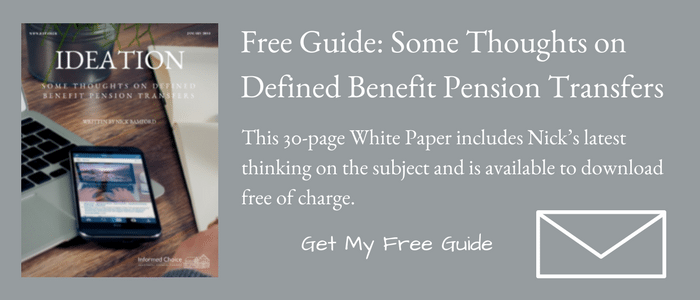Since the onset of pension freedoms on 6th April, we’ve not been deluged with enquiries from clients eager to access to the cash in their pension pots.
In fact, after five weeks of pension freedoms, we get the impression the response to the new rules has been pretty lukewarm.
One type of enquiry we have been receiving a lot more of since April is from individuals with deferred final salary (defined benefit) pensions.
People have been getting in touch with the Informed Choice team asking for advice on transferring their defined benefit pensions to a defined contribution pension pot, in order to access the new pension freedom rules.
Here’s the issue; it’s very rarely the right thing to do to transfer from a defined benefits arrangement.
Valuable benefits
These deferred final salary schemes tend to offer superior inflation-proofing and modest cash equivalent transfer values, which make matching the benefits in a personal pension environment impossible to achieve.
As regulated financial advisers, we are bound by the rule of suitability; we will only recommend what is suitable for our clients. If a particular course of action is unsuitable – such as transferring from a deferred defined benefits pension to exercise pension freedoms – we won’t recommend it.
However, in order to transfer out of a defined benefits pension, an individual needs to seek regulated financial advice before the scheme administrator will allow the transfer to take place, if the transfer value exceeds £30,000.
This rule was introduced for the protection of pension scheme members who might otherwise give up valuable pension benefits if they transferred away without first receiving professional advice.
So we have started receiving enquiries from people who have been told by their pension scheme administrators they need to take professional advice before they can access the value of their final salary pensions under the new pension freedom rules.
This puts us in a bit of a difficult position.
Difficult position
We are of course happy to engage with new clients, provide advice on the most suitable course of action and work with that client to implement the recommendation.
What we are unable to do, for reasons I will go onto explain, is engage with clients simply to facilitate the potentially unsuitable transfer of a defined benefits pension to a personal pension, so they can access the cash. Here’s why.
By working with someone on this basis – providing advice, the client deciding to do something different, and then us implementing that course of action – we still risk being responsible in the future for the action that was taken, even though it was against our recommendation.
Professional body guidance
Our professional body, the Personal Finance Society (PFS), has gone as far as advising us against facilitating potentially irreversible poor outcomes. This is because, in the event of a complaint, the Financial Ombudsman Service would take the general position that “a consumer cannot reasonably be expected to understand the complexity and associated risks, unless of course they have equal or greater knowledge than the adviser”.
As a result, we have determined here at Informed Choice we will not engage with clients who seek to use of simply as a facilitation service to satisfy the requirements of pension scheme administrators.
Whilst this stance means turning away prospective clients, we are comfortable as a business that our role should be working with individuals who value our impartial and professional advice, without introducing an unnecessary risk to this highly regulated business.
We recognise that this can make it difficult for individuals with genuine reasons to access their defined benefit pensions to obtain the professional advice we need, and we will continue to lobby the regulator and other bodies such as the Financial Ombudsman Service to fully clarify their positions for the benefit of consumers and advisers.


